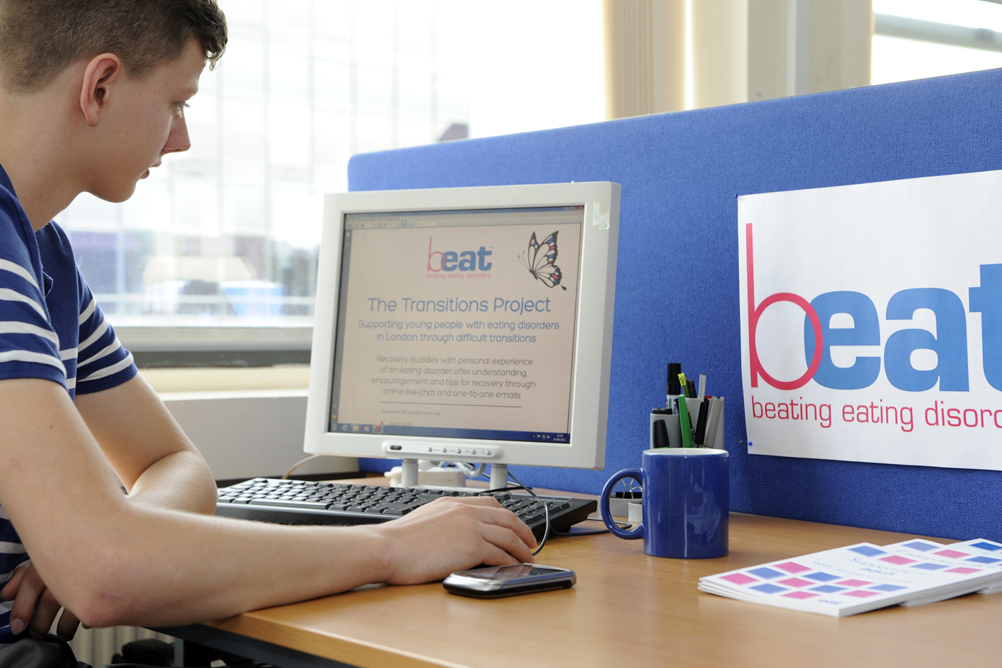
Provider Beat
Name The Transitions Project
“For the vast majority of service users, transition from Child and Adolescent Mental Health Services (CAMHS) to adult services is poorly planned, poorly executed and poorly experienced.” This was the stark assessment of transition services offered by a National Institute for Health Research study in 2010.
The institute’s conclusion highlights increasing concerns in recent years about the quality of support for young people moving from the CAMHS system into adult services. It was these concerns that prompted the charity Beat to launch an online recovery buddy service to make transitions smoother for young people with eating disorders.
The Transitions Project is led by Beat and will be offered to young people aged 16 to 26 in 14 London boroughs. It aims to help 500 young people over three years – both those who are mentored through the scheme and the buddies themselves. The project works by linking young people who have recovered from an eating disorder, with another embarking on a significant change. This could be moving from CAMHS to adult services, from inpatient to outpatient care, leaving treatment altogether or undergoing major life changes such as starting or leaving university.
Nina Dufeu, head of services at Beat, says supporting young people during transitions can prevent long-term problems. “People going through a transition are more likely to have a relapse with an eating disorder or fall out of services,” she says. “If at an early stage recovery falls apart because of a transition, the recovery will take longer. If that change can be managed in a supportive way, it’s less likely a relapse will be triggered.”
Dufeu says previous Beat mentoring projects have shown young people respond well to peer-to-peer support. “The recovery buddies won’t be talking about their own experiences, but they will be able to relate to what their mentee tells them and offer empathy.” She says the online element of the project is important because it gives vulnerable young people anonymity. “People sometimes find it difficult to be in a face-to-face situation. Although we’ll have a lot of detail about the mentee, they will have less barriers to face by simply coming online.”
Dufeu says the system will also be more convenient. “They won’t have to worry about travelling, which is something that can be challenging for people with an eating disorder.”
Beat is currently recruiting buddies and will train them in listening skills, how to provide confidential support and to be non-judgmental. The buddy will provide advice via email, and Beat has established that initially only six emails should be exchanged between the pair, to avoid the mentee developing dependency.
Buddies will mentor more than one young person, who will be carefully matched to ensure the partnership can build a rapport. “In the application process we ask recovery buddies about their interests, hobbies and any difficulties they might have experienced,” explains Dufeu. “Then we match up people with the same interests – or they might have had the same type of eating disorder – but we are not just focusing on the eating.”
Young people who want to have a mentor can self-refer to the scheme. At first they will receive an email from their appointed buddy, who will have discussed the case with a Beat project worker. The buddy will explain what they can offer the mentee, and they will agree a plan to overcome a particular problem the young person is facing. “The buddies will be supported by a project officer through regular supervisions and peer support among buddies,” says Dufeau.
Kate, a 25-year-old who has already signed up to become a recovery buddy, says her experiences of loneliness drove her to want to help her peers. “My personal experience lasted around six years during my teens and included moving away from home to university and the stresses of exam pressure,” she says. “I hope that my support will help to empower other sufferers and help them find positivity. Having an eating disorder can be so lonely so I hope to give people a feeling of being understood and supported.”
The project will also offer support to parents and carers of young people experiencing transition. Beat plans to create two forums where parents and carers can share their experiences and give each other advice.
The project has received £100,000 funding from the City Bridge Trust, which is earmarked for London services. But, Dufeu says, Beat has already had conversations with NHS funders to expand the project if it is successful.
Register Now to Continue Reading
Thank you for visiting Children & Young People Now and making use of our archive of more than 60,000 expert features, topics hubs, case studies and policy updates. Why not register today and enjoy the following great benefits:
What's Included
-
Free access to 4 subscriber-only articles per month
-
Email newsletter providing advice and guidance across the sector
Already have an account? Sign in here

